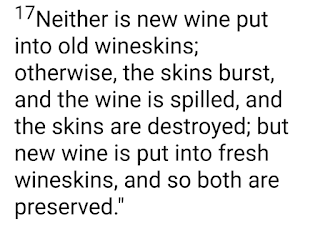Observation: First Timothy is known for its concern about getting the early church organized. This passage is about how we treat leaders. Elders who preach and teach well should receive "double honor". I guess that means honor for accepting the call to do it in the first place, and more honor for doing it well. On the other hand, leaders should also be held to account. If a leader has sinned, and it's corroborated by two or three witnesses, they should face the consequences publicly. Nothing should be swept under the rug.
Application: Being a leader in the church has always been an awesome responsibility, but especially today, when so many leaders have fallen so far short, it's that much more important to do what I do well. I can't read this passage without thinking about recent clergy sex abuse scandals, and how the church's respect for authority can be distorted into protection for predators. It's also hard not to see the many public faith leaders who have used God's word as a means for profit and personal power.
The witness of scripture is clear: we can honor and respect Christian leaders, and still hold them to account. They are not opposite values. In fact, accountability is part of respect. When we shield leaders from facing the truth of their actions, we tell the world that this is the best the church can do, and it's not very good. In fact, it's not even safe. But when we insist on truth and safety for all God's children, when we mutually spur one another on to do better, we're not disrespecting those in positions of power. We're showing what the church can be, and must be, if our mission would continue.
Even in minor things, it is not disrespectful to lovingly say to a pastor or church leader, "I think you can do better." Real disrespect would be to hold your tongue, and assume they can not grow. We can. We want to. We need your help.
Prayer: God, never will there be a day when I feel totally prepared, confident, and qualified to preach your word and lead your people. Yet, in all this time, the day hasn't yet come when I don't feel the call to do it, giving it my best, and being open to your best, through your Spirit. Let today be another day like that. Amen.
Application: Being a leader in the church has always been an awesome responsibility, but especially today, when so many leaders have fallen so far short, it's that much more important to do what I do well. I can't read this passage without thinking about recent clergy sex abuse scandals, and how the church's respect for authority can be distorted into protection for predators. It's also hard not to see the many public faith leaders who have used God's word as a means for profit and personal power.
The witness of scripture is clear: we can honor and respect Christian leaders, and still hold them to account. They are not opposite values. In fact, accountability is part of respect. When we shield leaders from facing the truth of their actions, we tell the world that this is the best the church can do, and it's not very good. In fact, it's not even safe. But when we insist on truth and safety for all God's children, when we mutually spur one another on to do better, we're not disrespecting those in positions of power. We're showing what the church can be, and must be, if our mission would continue.
Even in minor things, it is not disrespectful to lovingly say to a pastor or church leader, "I think you can do better." Real disrespect would be to hold your tongue, and assume they can not grow. We can. We want to. We need your help.
Prayer: God, never will there be a day when I feel totally prepared, confident, and qualified to preach your word and lead your people. Yet, in all this time, the day hasn't yet come when I don't feel the call to do it, giving it my best, and being open to your best, through your Spirit. Let today be another day like that. Amen.
























